Charles E W Bean, Diaries, AWM38 3DRL 606/247/1 - 1917 - 1933 - Part 16
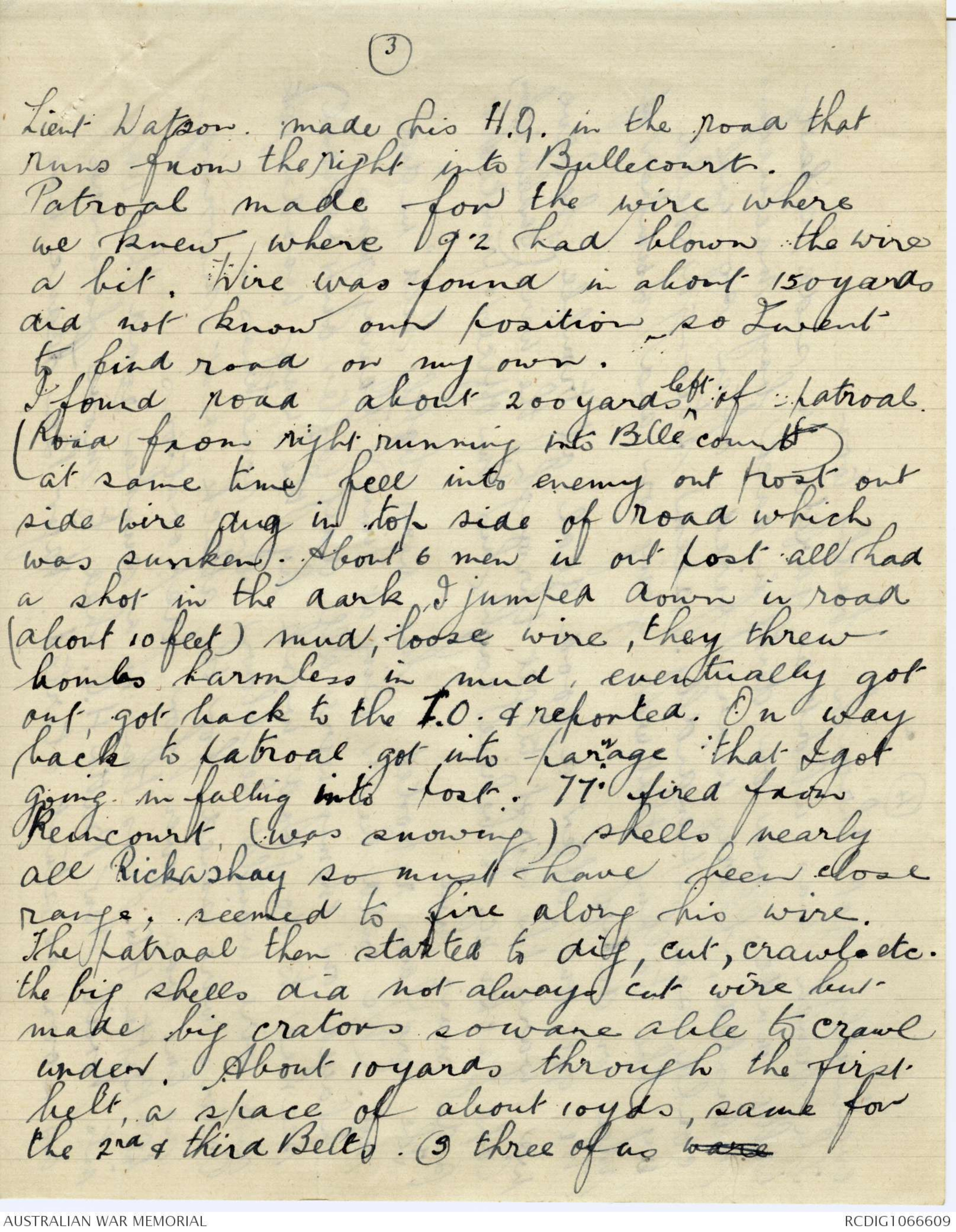
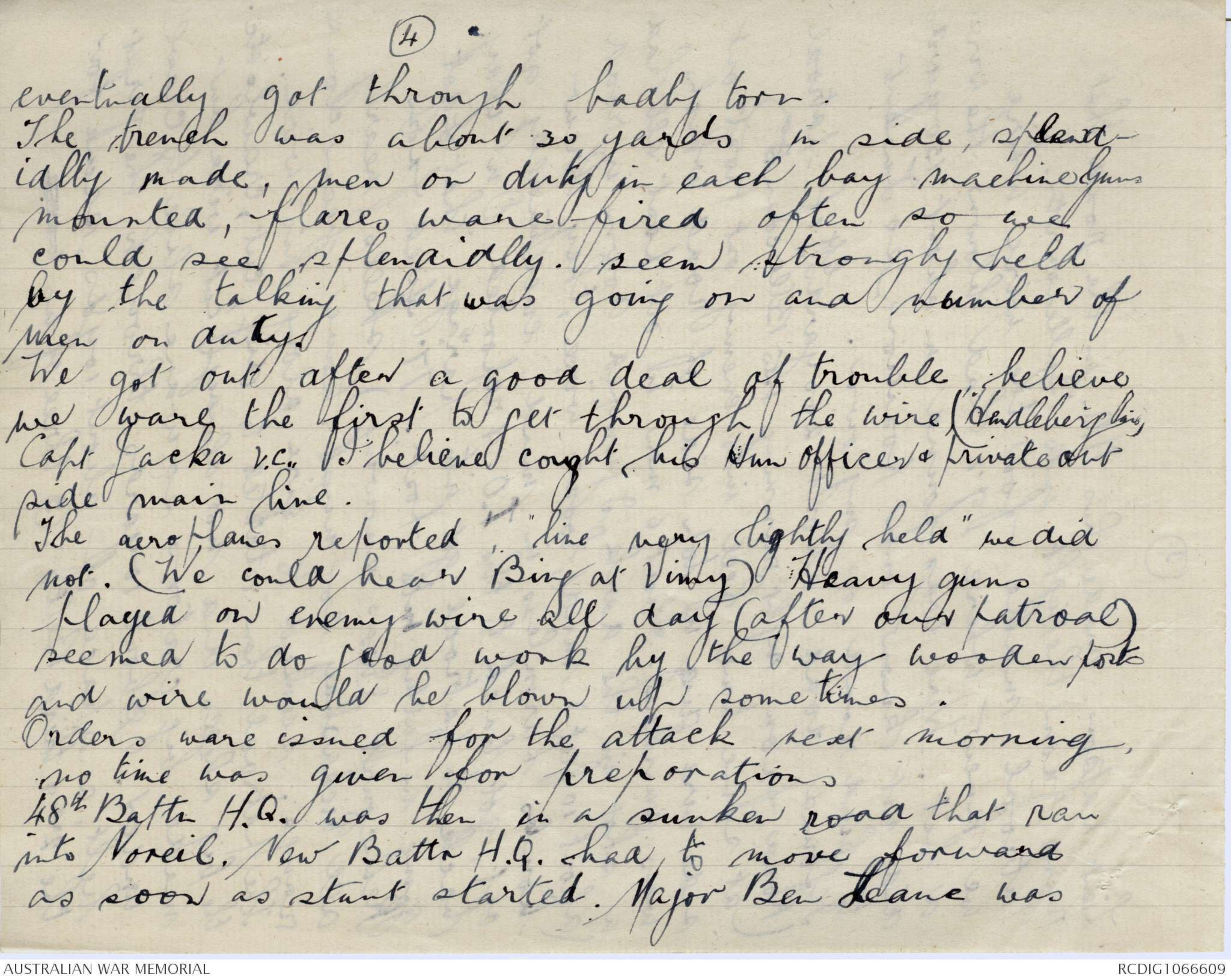
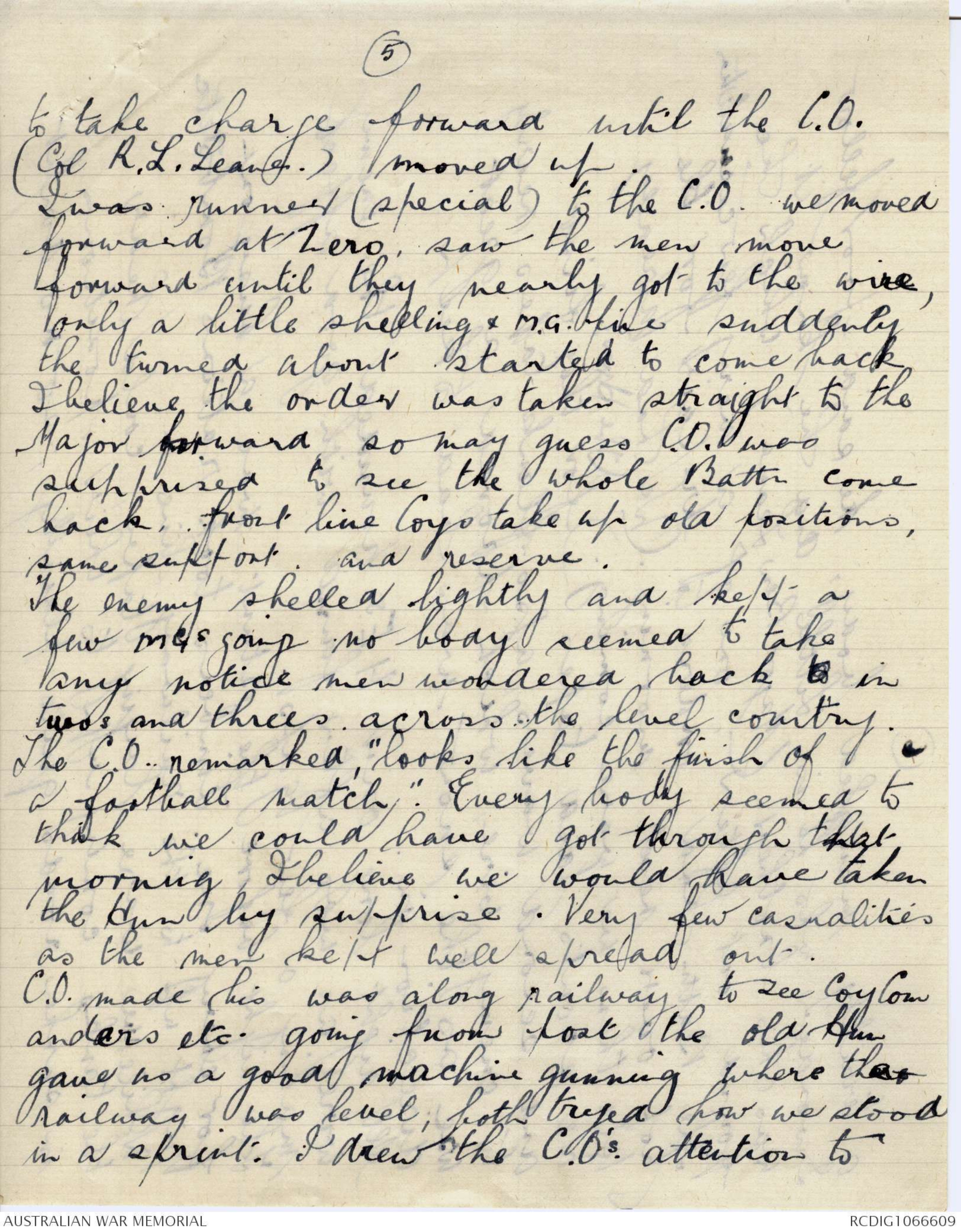
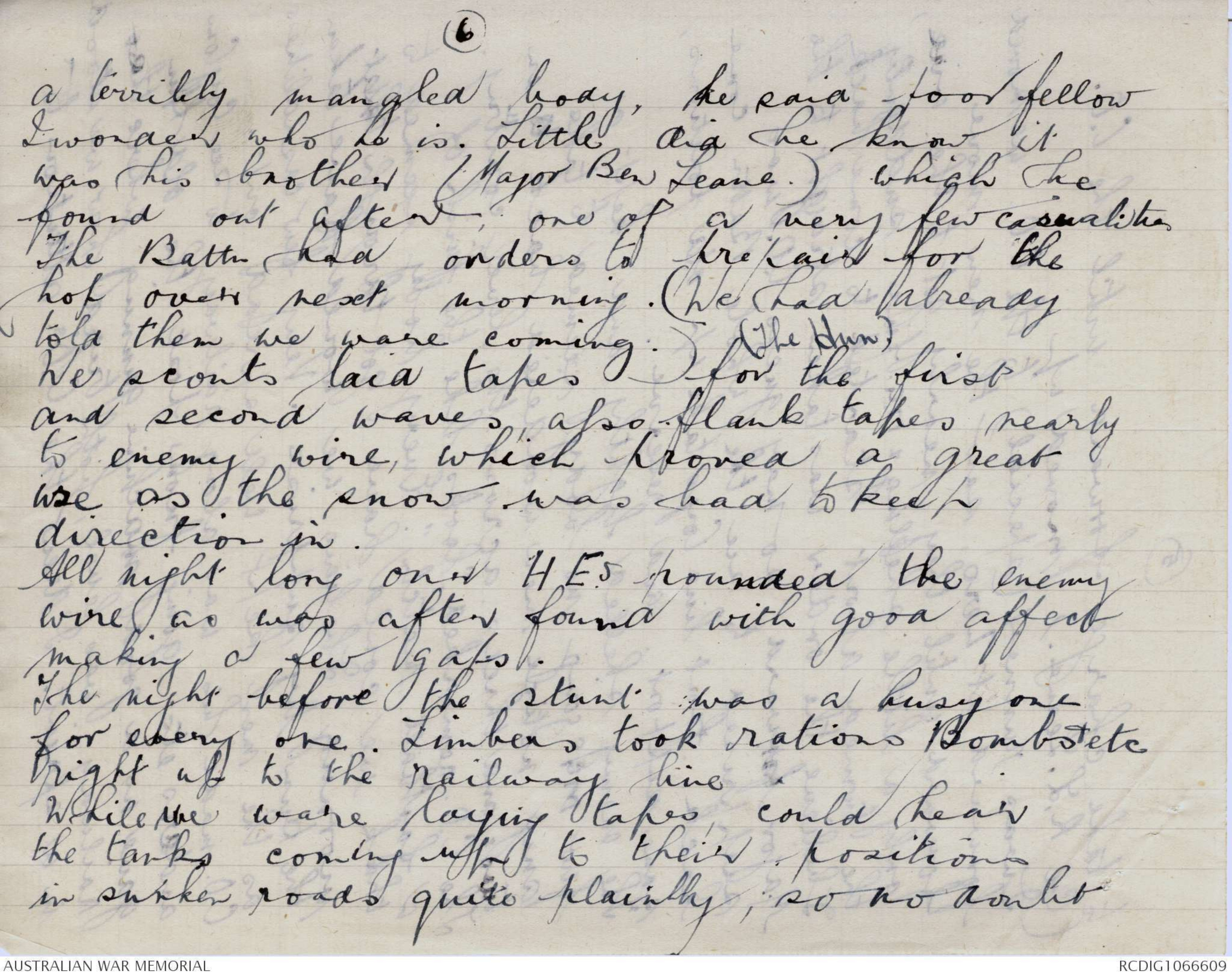
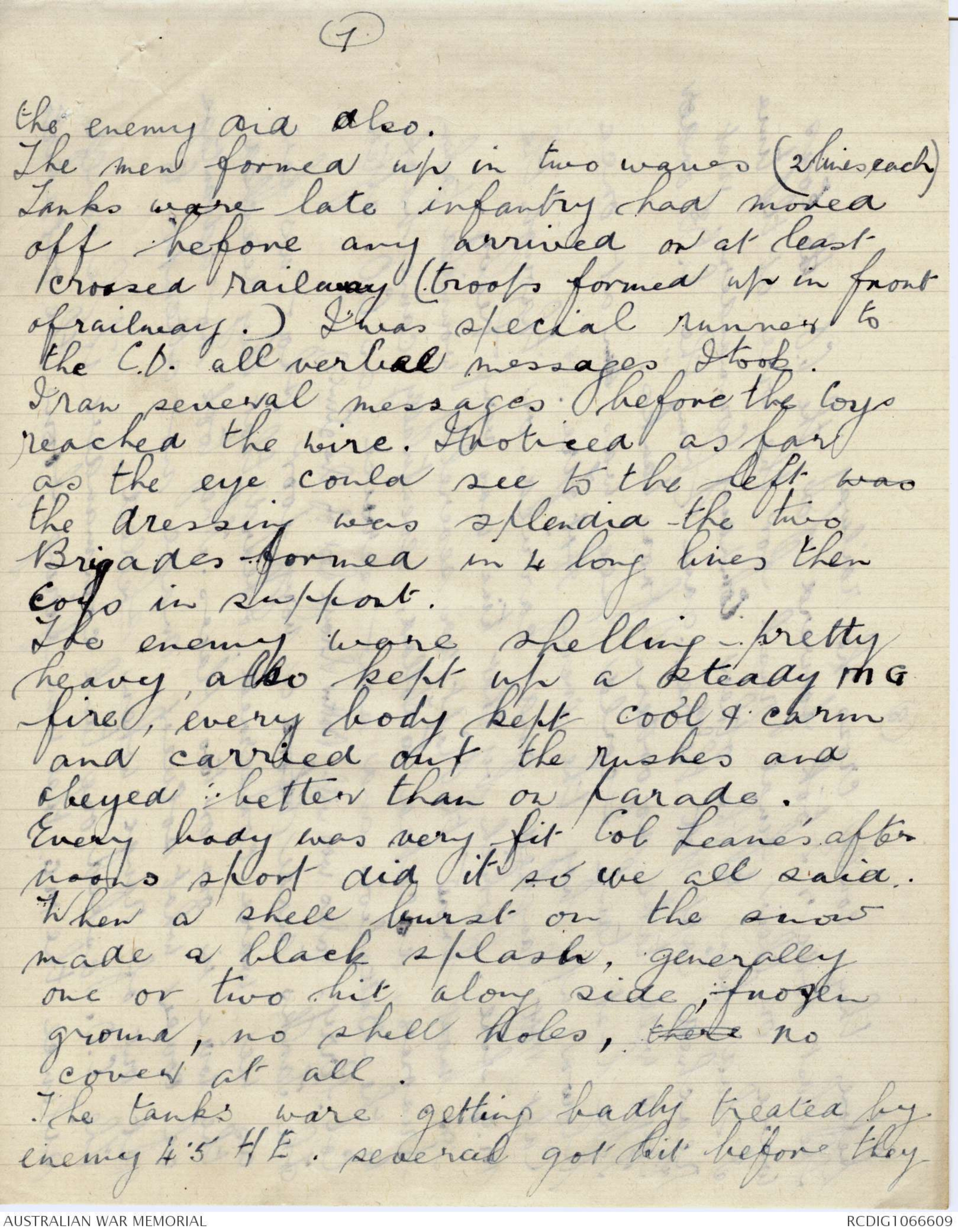
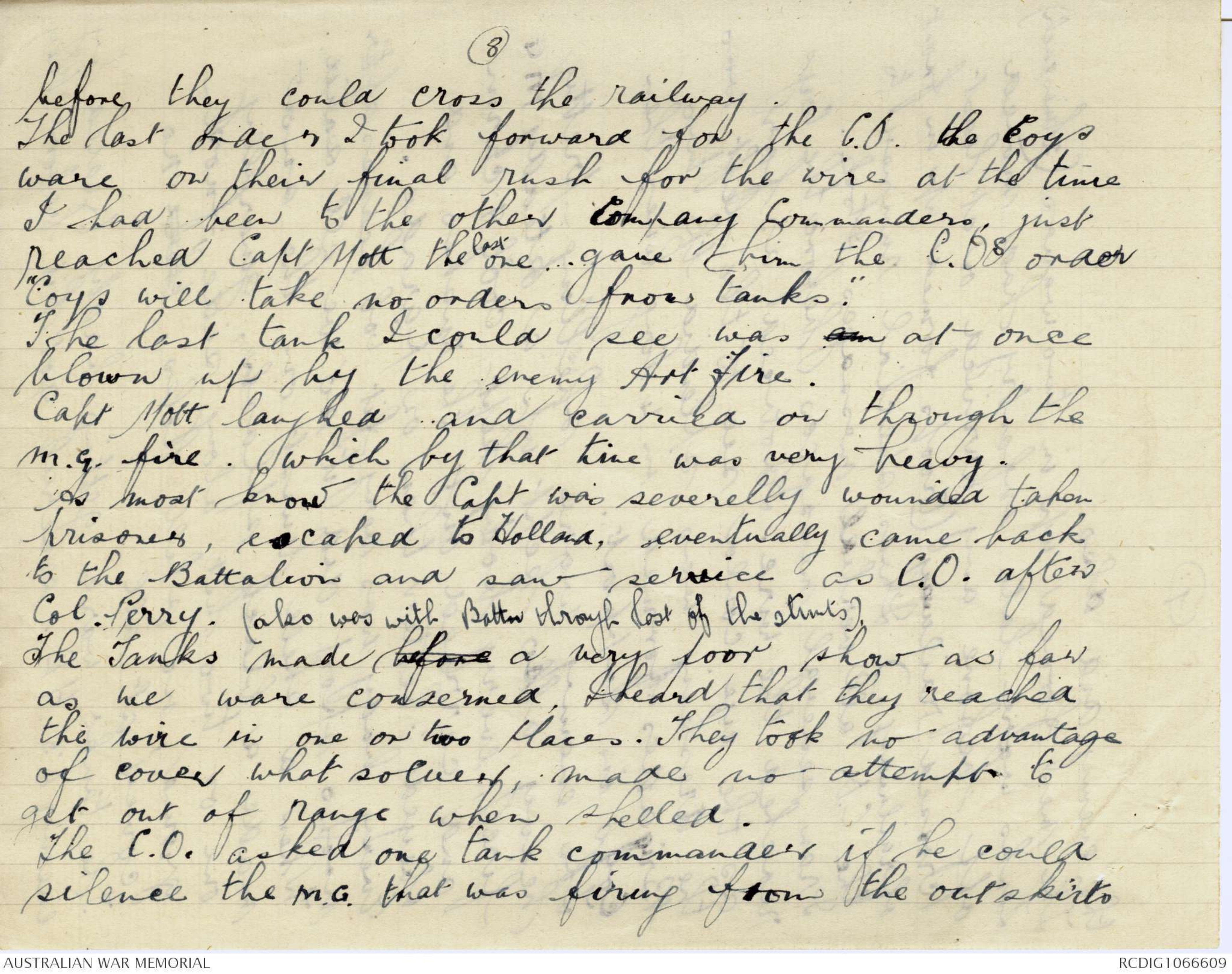
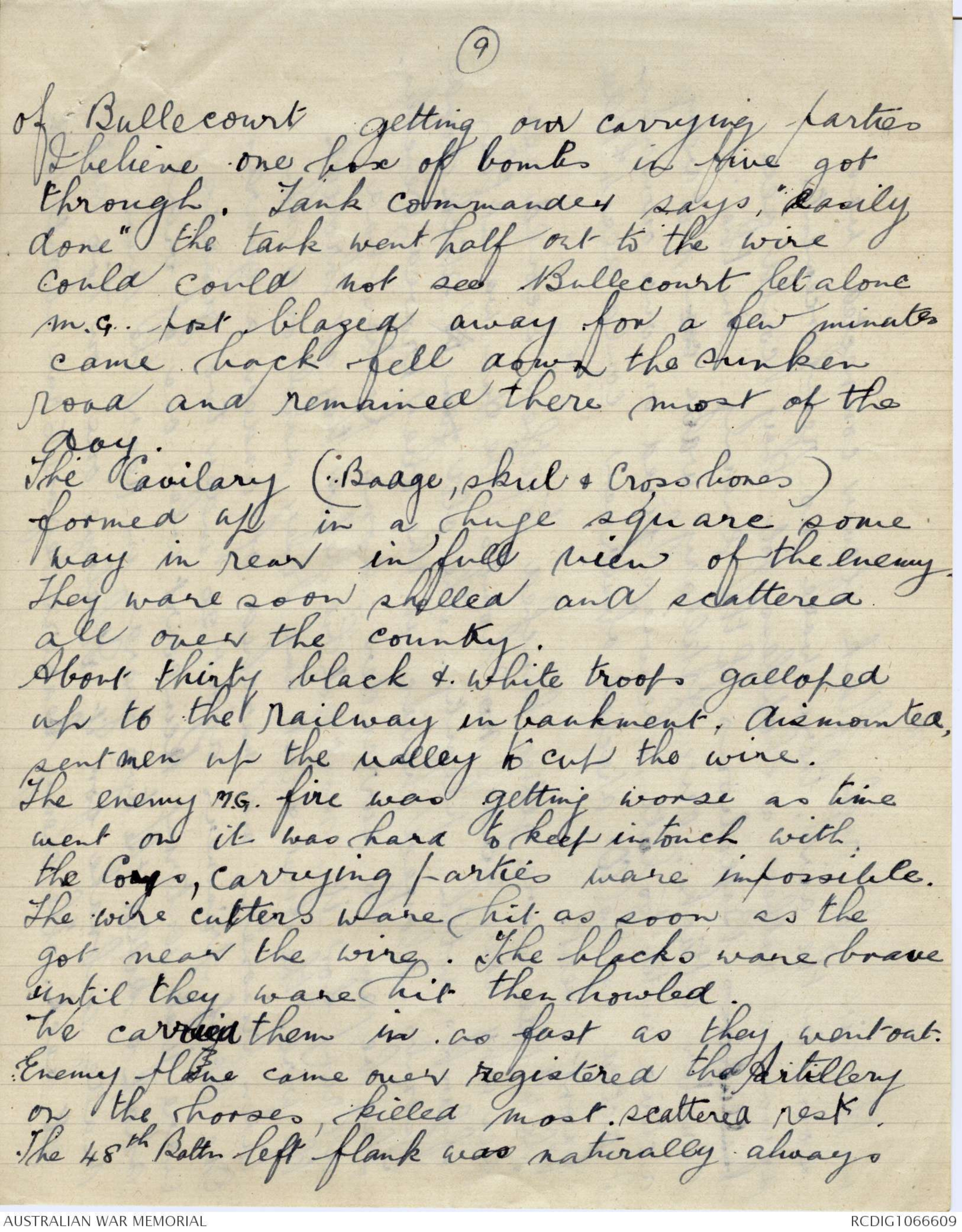
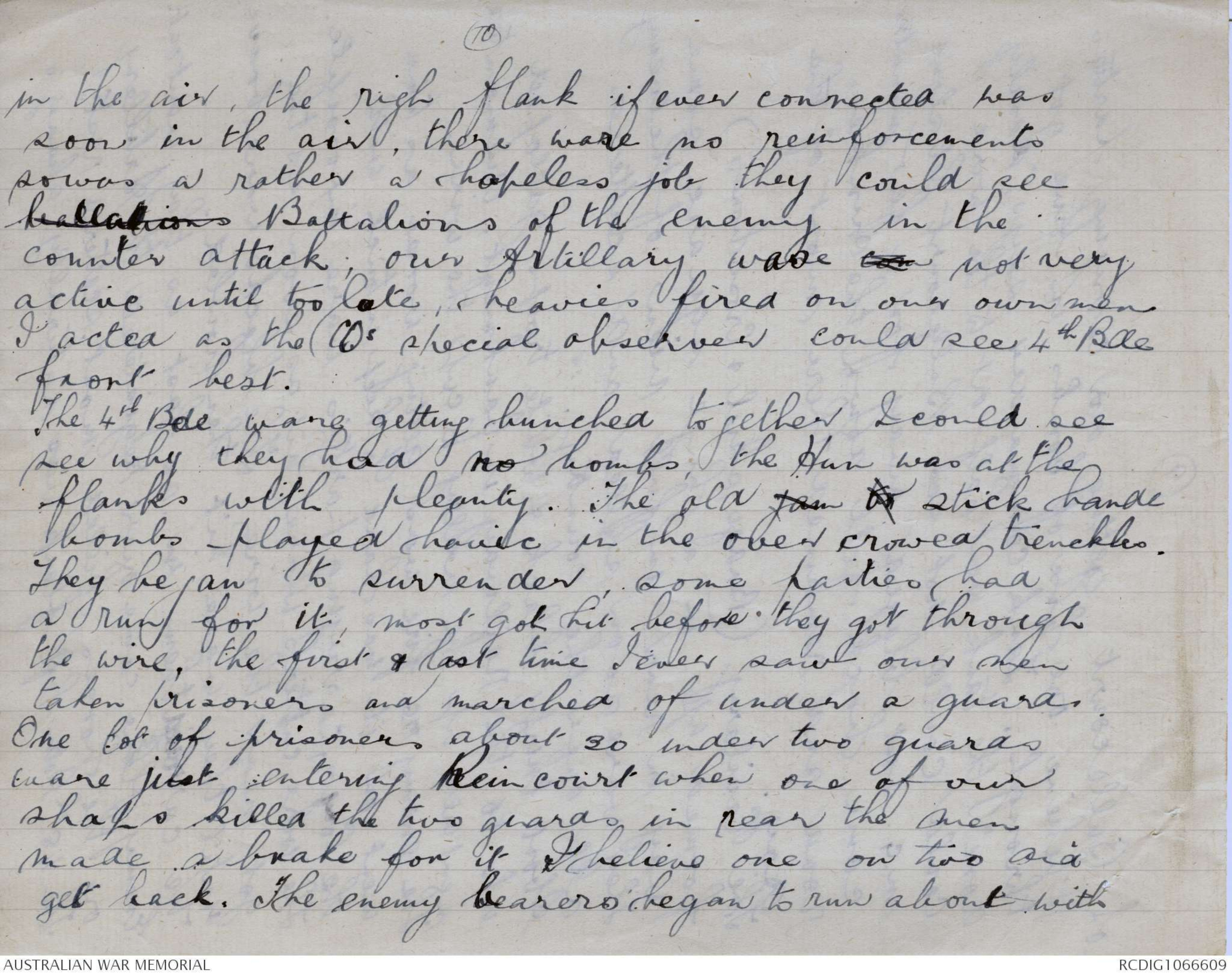
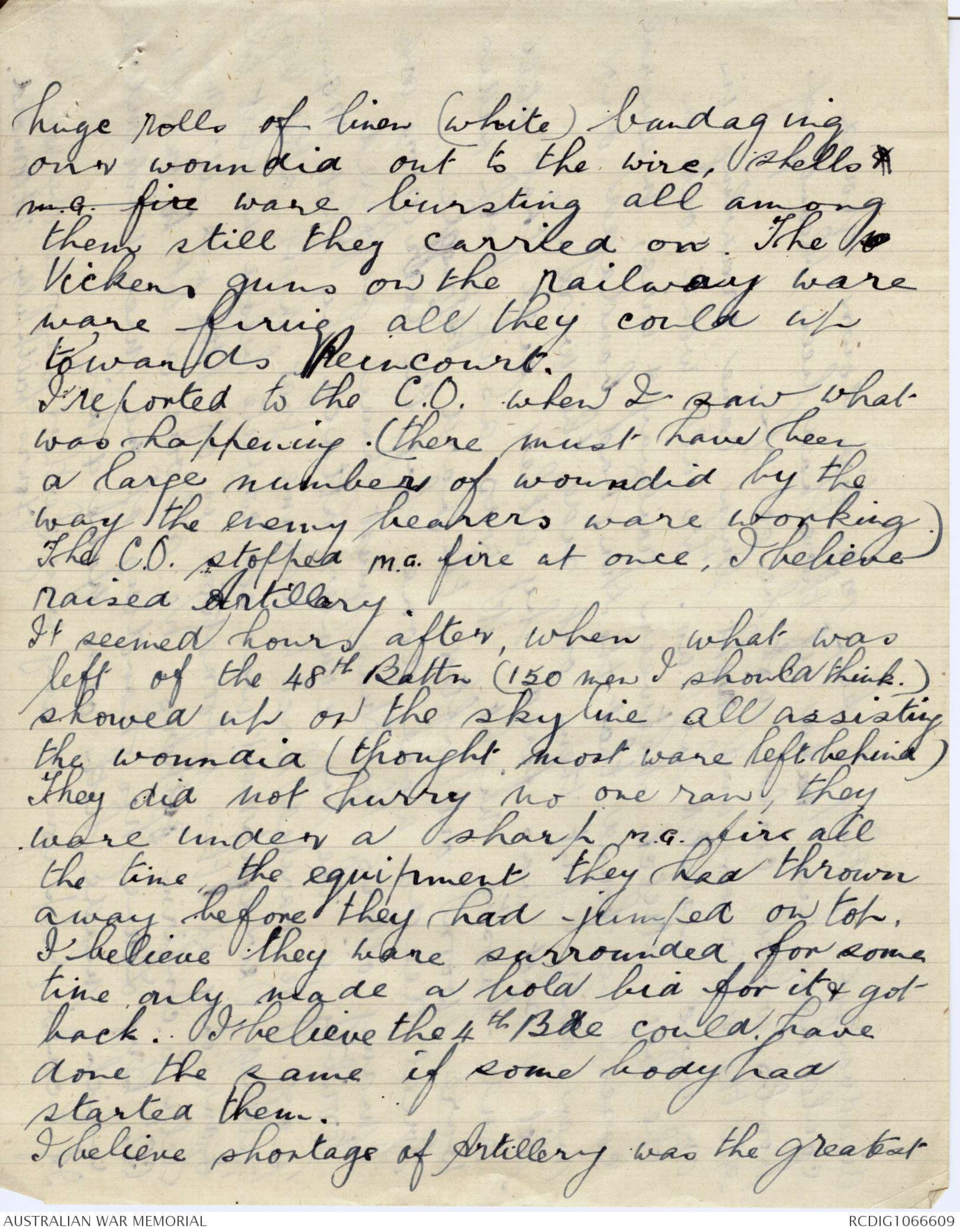
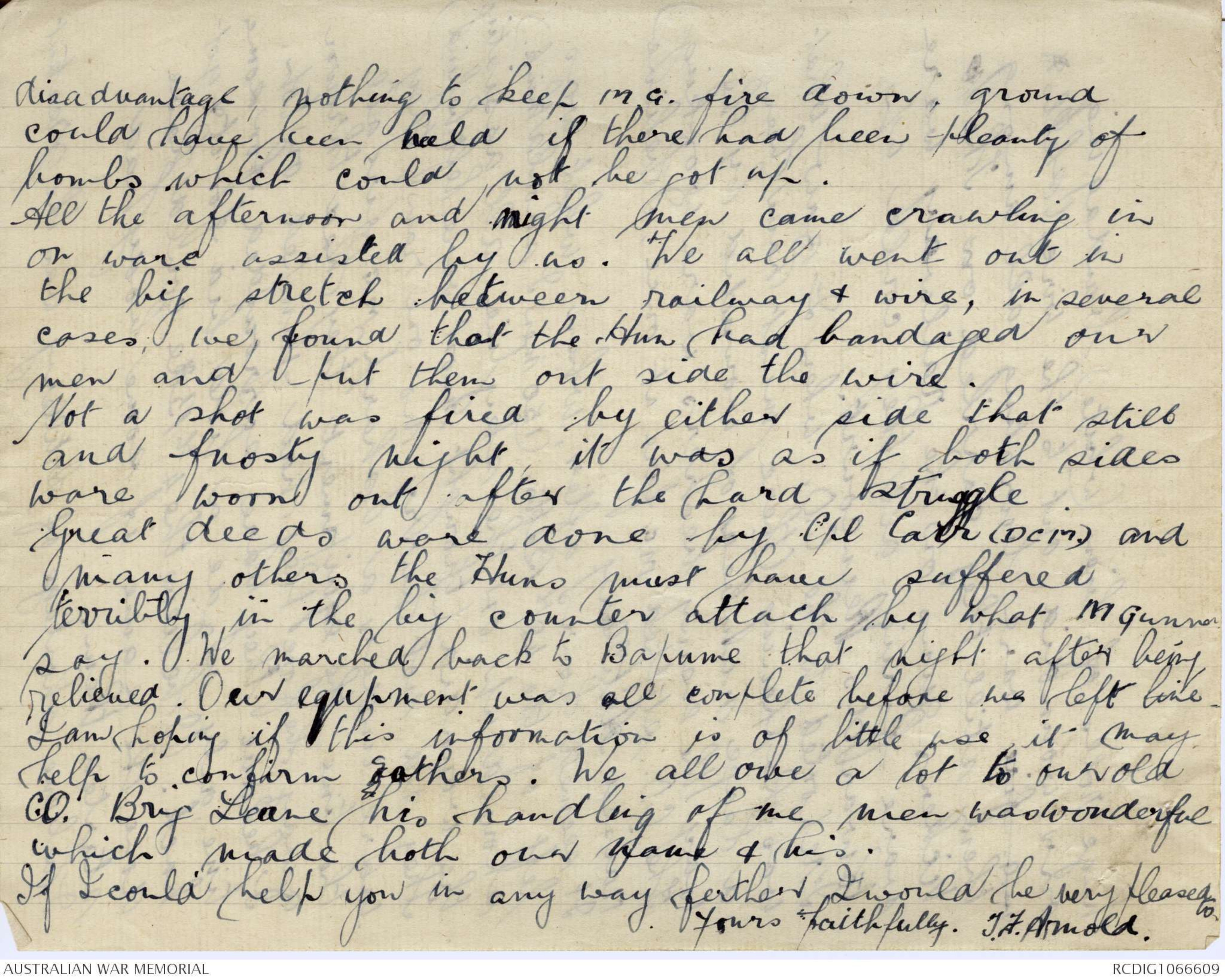
3
Lieut Watson. made his H.Q. in the road that
runs from the right into Bullecourt.
Patroal made for the wire where
we knew where 9.2 had blown the wire
a bit. Wire was found in about 150 yards
did not know our position so I went
to find road on my own.
I found road about 200 yards ^ left of patroal.
(road from night running into Bullecourt)
at same time fell into enemy out post out
side wire dug in top side of the road which
was sunken. About 6 men in out post all had
a shot in the dark. I jumped down in road
(about 10 feet) mud, loose wire, they threw
bombs harmless in mud, eventually got
out, got back to the I.O. & reported. On way
back to patroal got into barrage that I got
going in falling into post. 77 fired from
Reincourt (was snowing) shells nearly
all Rickashay so must have been close
range, seemed to fire along his wire.
The patraol then started to dig, cut, crawl etc.
the big shells did not always cut wire but
made big crators so ware able to crawl
under. About 10 yards through to the first
belt, a space of about 10yds, same for
the 2nd & third Belts. (3) three of us wane
(4).
eventually got through badly torn.
The trench was about 30 yards in side, splendidly
made, men on duty in each bay machine Guns
mounted, flares, were fired often so we
could see splendidly. seem strongly held
by the talking that was going on and number of
men on duty.
We got out after a good deal of trouble believe
we ware the first to get through the wire (Heidelberg)
Capt Jacka V.C. I believe caught his Hun officer & private out
side main line.
The aeroplanes reported line very lightly held " we did
not. (We could hear Bing at Vimy). Heavy guns
played on enemy wire all day (after our patroal
seemed to do good work by the way wooden posts
and wire would be blown up sometimes.
Orders were issued for the attack next morning,
no time was given for preporations
48thBattn H.Q. was then in a sunken road that ran
into Noreil. New Battn H.Q. had to move forward
as soon as stunt started. Major Ben Leane was
(5)
to take charge forward until the C.O.
(Col R.L. Leane) moved up.
I was runner (special) to the C.O. we moved
forward at Zero, saw the men move
forward until they nearly got to the wire,
only a little shelling & M.G. fire suddenly
the turned about started to come back
I believe the order was taken straight to the
Major forward so may guess C.O. was
surprised to see the whole Battn come
back, front line Coys take up old positions,
same support and reserve.
The enemy shelled lightly and kept a
few Mgs going no body seemed to take
any notice men wondered back to in
twos and threes across the level country.
The C.O. remarked, "looks like the finish of
a football match". Every body seemed to
think we could have got through that
morning, I believe we would have taken
the Hun by surprise. Very few casualties
as the men kept well spread out.
C.O. made his was along railway to see Coy Commanders
etc. going from post the old Hun
gave us a good machine gunning where that
railway was level, both tryed how we stood
in a sprint. I drew the C.O's attention to
(6)
a terribly mangled body, he said poor fellow
I wonder who he is. Little did he know it
was his brother (Major Ben Leane.) which he
found out after, one of a very few casualities
The Battn had orders to prepair for the
hop over next morning. (We had already
told them we ware coming.) (The Hun.)
We scouts laid tapes for the first
and second waves, also flank tapes nearly
to enemy wire, which proved a great
use as the snow was had to keep
direction in.
All night long our H.Es pounded the enemy
wire as was after found with good affect
making a few gaps.
The night before the stunt was a busy one
for every one. Limbers took rations Bombs & etc
right up to the railway line.
While we ware laying tapes could hear
the tanks coming up to their position
in sunken roads quite plainly, so no doubt
(7)
the enemy did also.
The men formed up in two waves (2 lines each)
Tanks ware late infantry had moved
off before any arrived on at least
crossed railway (troops formed up in front
of railway.) I was special runner to
the C.O. all verbal messages I took
I ran several messages before the Coys
reached the wire. I noticed as far
as the eye could see to the left was
the dressing was splendid the two
Brigades formed in 4 long lines then
Coys in support.
The enemy ware shelling pretty
heavy also kept up a steady M G
fire, every body kept cool & carm
and carried out the rushes and
obeyed better than on parade.
Enemy body was very fit Col Leane's after
noons sport did it so we all said.
When a shell burst on the snow
made a black splash, generally
one or two hit along side, frozen
ground, no shell holes, there no
cover at all.
The tanks ware getting badly treated by
enemy 4.5 HE, several got hit before they
(8)
before they could cross the railway.
The last orders I took forward for the C.O. the Coys
ware on their final rush for the wire at the time
I had been to the other Company Commanders, just
reached Capt Mott the last one... gave him the C.Os order
“Coys will take no orders from tanks".
The last tank I could see was am at once
blown up by the enemy Art Fire.
Capt Mott laughed and carried on through the
M.G. fire. which by that time was very heavy.
As most know the Capt was severelly wounded taken
prisoner, escaped to Holland, eventually came back
to the Battalion and saw service as C.O. after
Col.Perry. (also was with Battn through last of the stunts).
The Tanks made before a very poor show as far
as we ware conserned. I heard that they reached
the wire in one or two places. They took no advantage
of cover what so ever, made not attempt to
get out of range when shelled.
The C.O. asked one tank commander if he could
silence the M.G that was firing from the outskirts
(9)
of Bullecourt getting our carrying parties
I believe one box of bombs in five got
through. Tank commander says "easily
done" the tank went half out to the wire
could could not see Bullecourt let alone
M.G. post blazed away for a few minutes
came back fell down the sunken
road and remained there most of the
day.
The Cavilary (Badge, skul & Crossbones)
formed up in a huge square some
way in rear in full view of the enemy.
They ware soon shelled and scattered
all over the country.
About thirty black & white troops galloped
up to the railway enbankment, dismounted,
sent men up the valley to cut the wire.
The enemy M.G. fire was getting worse as time
went on it was hard to keep in touch with
the Coys, carrying parties ware impossible.
The wire cutters ware hit as soon as the
got near the wire. The blacks ware brave
until they ware hit then howled.
We carried them in as fast as they went out.
Enemy flare came over registered the Artillery
on the horses, killed most, scattered rest.
The 48th Battn left flank was naturally always
(10)
in the air, the righ flank if ever connected was
soon in the air, there ware no reinforcements
so was a rather a hopeless job they could see
ballations Battalions of the enemy in the
counter attack; our Artillary was can not very
active until too late, heavies fired on our own men
I acted as the COs special observer could see 4th Bde
front best.
The 4th Bde ware getting bunched together I could see
see why they had no bombs, the Hun was at the
flanks with plenty. The old jam too stick hand
bombs played havic in the over crowed trenches.
They began to surrender some parties had
a run for it, most got hit before they got through
the wire, the first & last time I ever saw our men
taken prisoners and marched of under a guard.
One lot of prisoners about 30 under two guards
ware just entering Reincourt when one of our
chaps killed the two guards in rear the men
made a brake for it. I believe one or two did
get back. The enemy bearers began to run about with
huge rolls of linen (white) bandaging
our woundid out to the wire, shells &
M.G. fire ware bursting all among
them still they carried on. The so
Vickers guns on the railway ware
ware firing all they could up
towards Reincourt.
I reported to the C.O. when I saw what
was happening. (there must have been
a large number of woundid by the
way the enemy bearers ware working.)
The C.O. stopped M.G. fire at once, I believe
raised Artillery.
It seemed hours after, when what was
left of the 48th Battn (150 men I should think.)
showed up on the skyline all assisting
the woundid (thought most ware left behind)
They did not hurry no one ran, they
ware under a sharp M.G. fire all
the time, the equipment they had thrown
away before they had jumped on top.
I believe they ware surround for some
time only made a hold bid for it & got
back. I believe the 4th Bde could have
done the same if some body had
started them.
I believe shortage of Artillery was the greatest
disadvantage, nothing to keep M.G. fire down, ground
could have been held if there had been plenty of
bombs which could not be got up.
All the afternoon and night men came crawling in
or ware assisted by us. We all went out in
the big stretch between railway & wire, in several
cases we found that the Hun had bandaged our
men and put them out side the wire.
Not a shot was fired by either side that still
and frosty night it was as if both sides
ware worn out after the hard struggle.
Great deeds ware done by Cpl Carr (DCM) and
many others the Huns must have suffered
terribly in the big counter attack by what MGunners
say. We marched back to Bapume that night after being
relieved. Our equipment was all complete before we left line.
I am hoping if this information is of little use it may
help to confirm others. We all owe a lot to our old
C.O. Brig Leane his handling of the men was wonderful
which made both our name & his.
If I could help you in any way further I would be very please to.
Yours faithfully
T.F.Arnold.
 Maralyn K
Maralyn KThis transcription item is now locked to you for editing. To release the lock either Save your changes or Cancel.
This lock will be automatically released after 60 minutes of inactivity.